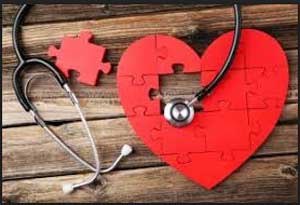- Home
- Editorial
- News
- Practice Guidelines
- Anesthesiology Guidelines
- Cancer Guidelines
- Cardiac Sciences Guidelines
- Critical Care Guidelines
- Dentistry Guidelines
- Dermatology Guidelines
- Diabetes and Endo Guidelines
- Diagnostics Guidelines
- ENT Guidelines
- Featured Practice Guidelines
- Gastroenterology Guidelines
- Geriatrics Guidelines
- Medicine Guidelines
- Nephrology Guidelines
- Neurosciences Guidelines
- Obs and Gynae Guidelines
- Ophthalmology Guidelines
- Orthopaedics Guidelines
- Paediatrics Guidelines
- Psychiatry Guidelines
- Pulmonology Guidelines
- Radiology Guidelines
- Surgery Guidelines
- Urology Guidelines
Broken heart can give you cancer, finds AHA Study

Delhi: Broken heart syndrome can indeed give you cancer and vice versa -- is the finding of a recent American Heart Association (AHA) study.
The study, published in the Journal of the American Heart Association, found that 1 in 6 people with broken heart syndrome had cancer. Also, such people are less likely to survive for five years after it has occurred compared to broken heart syndrome patients without cancer.
"Screening patients with broken heart syndrome for cancer and vice versa may help improve their care and increase their lifespan, write the authors.
Broken heart syndrome, also called stress cardiomyopathy or takotsubo syndrome (TTS) is a temporary heart condition caused by emotional or physical stress, can also be triggered by serious physical illness or surgery. It occurs when the main pumping chamber of the heart temporarily changes and does not pump well. It may cause sudden chest pain, shortness of breath, feeling like one is having a heart attack. There is no heart muscle damage and no blockage in the coronary arteries feeding the heart.
Increased levels of stress hormones are thought to be one of the main drivers of broken heart syndrome. And some experts believe that cancer may also play a role. This international study of patients from 26 centres provides the strongest association yet between the syndrome and cancer.
Christian Templin, University Heart Center, Department of Cardiology, University Hospital Zurich, Zurich, Switzerland, and colleagues conducted this study to explore differences in clinical characteristics and to investigate short-and long‐term outcomes in TTS patients with or without malignancy.
Also Read: 'Broken heart' or Takotsubo syndrome may have its origin in brain,finds study
For the study, the researchers enrolled 1,604 patients with broken heart syndrome from the International Takotsubo Registry. Out of which, 267 patients or 1 in 6 (average age 69.5 years, 87.6% female) had cancer. Compared to those without cancer, researchers found that patients with cancer were:
- Less likely to have experienced an emotional trigger for the syndrome, 18.0% vs. 30.3%.
- More likely to have experienced a physical trigger (such as medical intervention or physical trauma) prior to the syndrome, 47.9% vs. 34.2%.
- Just as likely to survive for 30 days after the syndrome began, although more likely to die or require intensive heart and respiratory support while in the hospital.
- More likely to die within 5 years after the syndrome began.
Also Read: Emotional stress good for people with Takotsubo syndrome: JACC
The study was too small to analyze whether the worse prognosis in patients with broken heart syndrome and cancer might be due to a specific type or stage of cancer, or the cancer treatments received.
"The mechanism by which malignancy and cancer treatment may promote the development of broken heart syndrome should be explored, and our findings provide an additional reason to investigate the potential cardiotoxic effects of chemotherapy," Templin said.
To read the complete study follow the link: https://doi.org/10.1161/JAHA.118.010881

Disclaimer: This site is primarily intended for healthcare professionals. Any content/information on this website does not replace the advice of medical and/or health professionals and should not be construed as medical/diagnostic advice/endorsement or prescription. Use of this site is subject to our terms of use, privacy policy, advertisement policy. © 2020 Minerva Medical Treatment Pvt Ltd